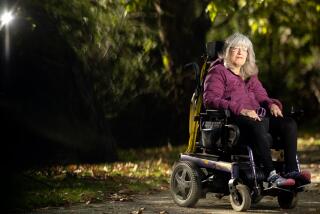California Supreme Court addresses legal deadlines for tobacco lawsuits
- Share via
Reporting from San Francisco -- Smokers may sue the tobacco industry once they develop a disease like lung cancer, even if they suffered different smoking-related ailments years earlier, the California Supreme Court ruled unanimously Thursday.
The decision is likely to keep lawsuits alive that might otherwise have been thrown out because of expired legal deadlines and allow new suits to be filed, lawyers who filed the suit said.
In the case before the court, Nikki Pooshs, a former smoker, was diagnosed with chronic obstructive pulmonary disease in 1989 and a couple of years later with periodontal disease, both attributable to smoking. But she did not sue the tobacco industry until she was diagnosed with lung cancer in 2003.
Cigarette makers argued that her suit should be dismissed because the timetable for suing began when she first discovered that smoking had injured her in 1989. State law gives people two years to sue after discovering an injury.
The state high court, in a ruling written by Justice Joyce L. Kennard, concluded that an early disease may not trigger the legal deadline for filing suit if the injury was “separate and distinct” from the later ailment.
“We hold that two physical injuries — both caused by the same tobacco use over the same period of time — can, in some circumstances, be considered ‘qualitatively different’ for determining when the clock begins ticking on legal deadlines, Kennard wrote.
Pooshs’ lawsuit is before the U.S. 9th Circuit Court of Appeals, which asked the state high court to clarify how legal deadlines apply under California law.
In a prepared statement, Philip Morris U.S.A. Inc. downplayed the importance of the ruling, declaring it would affect only “a very small fraction” of lawsuits.
“Although we are disappointed with the decision, the California Supreme Court made it clear that it was not addressing the merits of this case or any case,” the statement said. “Rather, the decision addresses a narrow technical point of law relating to the statute of limitations.”
But Lloyd LeRoy, an attorney for Pooshs, called the ruling “extremely significant, particularly for tobacco litigation in California.”
Until Thursday’s ruling, smokers could not sue after getting lung cancer if their medical records showed they were diagnosed with smoker’s cough or another smoking-related ailment years earlier, LeRoy said.
“What this says is the courtroom door is open again,” LeRoy said.
Pooshs filed the lawsuit for damages for medical and other economic costs and pain and suffering less than a year after she received the lung cancer diagnosis. She said she smoked cigarettes from 1953 until the end of 1987 and did not know many of the dangers of smoking. Her suit charged that the tobacco industry gave misleading information about the perils and the addictive property of tobacco.
“Now tobacco must defend its products in California on the merits instead of tortured statute of limitations arguments…,” said Gil Purcell, who also represents Pooshs. “We look forward to California juries getting to hear the sordid story that is big tobacco.”
More to Read
Sign up for Essential California
The most important California stories and recommendations in your inbox every morning.
You may occasionally receive promotional content from the Los Angeles Times.











